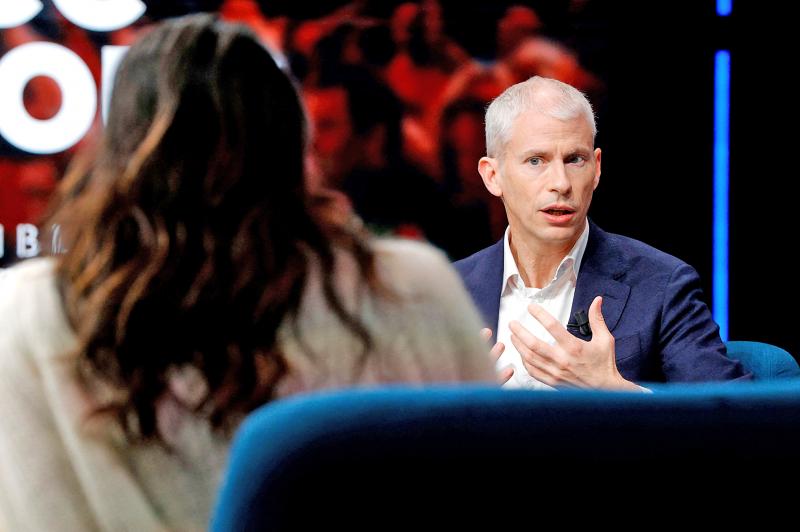France, which holds the EU’s rotating presidency, on Sunday said that the EU would firmly back its member state Lithuania in its brewing trade dispute with China.
French Minister Delegate for Foreign Trade and Economic Attractiveness Franck Riester said that his counterparts meeting in the French port city of Marseille felt strongly that the small Baltic nation was a victim of coercion from Beijing and would fast-track plans that could give Europe new powers to fight back.
Relations between Brussels and Beijing are at a low point after a failure to ratify a long negotiated investment deal was followed by a round of tit-for-tat sanctions that was sparked by European concern for the plight of the Uighur minority in China’s Xinjiang.

Photo: AFP
“What China is doing with Lithuania is clearly coercion. The Chinese are using trade and economic weapons to put political pressure on us,” Riester said before EU trade ministers were due to discuss the matter.
Lithuania’s dispute with China began when the name of a newly opened Taiwanese representative office in Vilnius explicitly referred to “Taiwan” instead of “Taipei,” as is common practice to placate Beijing.
In retaliation, Beijing downgraded diplomatic ties and Lithuanian exports have been stopped at China’s border, with widespread reports that European exporters have been cautioned by Beijing to cut all ties with the nation.
“It doesn’t matter what happened between China and Lithuania. That’s not the point. The point is how China has chosen to address [its grievance],” Riester said.
The European Commission, the EU executive that handles trade policy for the 27 member states, has already filed a case at the WTO, though that process could take months or years.
The EU said it is also pursuing diplomatic solutions, but Reister said that a proposal for Europe to give itself a so-called anti-coercion capability is well on track.
The tool could include freezing access to public contracts, holding up health and safety authorizations on certain products or bans from EU-funded research projects.
Riester said the tougher strategy on China and other “disloyal” actors was part of a “paradigm shift” in EU trade policy that for too long saw free trade and opening new markets as an end in itself.
Trade is an essential part of the European economy, he said, “but not at any price ... not at the price of unfair competition, not at the price of our values.”

CALL FOR SUPPORT: President William Lai called on lawmakers across party lines to ensure the livelihood of Taiwanese and that national security is protected President William Lai (賴清德) yesterday called for bipartisan support for Taiwan’s investment in self-defense capabilities at the christening and launch of two coast guard vessels at CSBC Corp, Taiwan’s (台灣國際造船) shipyard in Kaohsiung. The Taipei (台北) is the fourth and final ship of the Chiayi-class offshore patrol vessels, and the Siraya (西拉雅) is the Coast Guard Administration’s (CGA) first-ever ocean patrol vessel, the government said. The Taipei is the fourth and final ship of the Chiayi-class offshore patrol vessels with a displacement of about 4,000 tonnes, Lai said. This ship class was ordered as a result of former president Tsai Ing-wen’s (蔡英文) 2018

UKRAINE, NVIDIA: The US leader said the subject of Russia’s war had come up ‘very strongly,’ while Jenson Huang was hoping that the conversation was good Chinese President Xi Jinping (習近平) and US President Donald Trump had differing takes following their meeting in Busan, South Korea, yesterday. Xi said that the two sides should complete follow-up work as soon as possible to deliver tangible results that would provide “peace of mind” to China, the US and the rest of the world, while Trump hailed the “great success” of the talks. The two discussed trade, including a deal to reduce tariffs slapped on China for its role in the fentanyl trade, as well as cooperation in ending the war in Ukraine, among other issues, but they did not mention

HOTEL HIRING: An official said that hoteliers could begin hiring migrant workers next year, but must adhere to a rule requiring a NT$2,000 salary hike for Taiwanese The government is to allow the hospitality industry to recruit mid-level migrant workers for housekeeping and three other lines of work after the Executive Yuan yesterday approved a proposal by the Ministry of Labor. A shortage of workers at hotels and accommodation facilities was discussed at a meeting of the legislature’s Transportation Committee. A 2023 survey conducted by the Tourism Administration found that Taiwan’s lodging industry was short of about 6,600 housekeeping and cleaning workers, the agency said in a report to the committee. The shortage of workers in the industry is being studied, the report said. Hotel and Lodging Division Deputy Director Cheng

‘SECRETS’: While saying China would not attack during his presidency, Donald Trump declined to say how Washington would respond if Beijing were to take military action US President Donald Trump said that China would not take military action against Taiwan while he is president, as the Chinese leaders “know the consequences.” Trump made the statement during an interview on CBS’ 60 Minutes program that aired on Sunday, a few days after his meeting with Chinese President Xi Jinping (習近平) in South Korea. “He [Xi] has openly said, and his people have openly said at meetings, ‘we would never do anything while President Trump is president,’ because they know the consequences,” Trump said in the interview. However, he repeatedly declined to say exactly how Washington would respond in